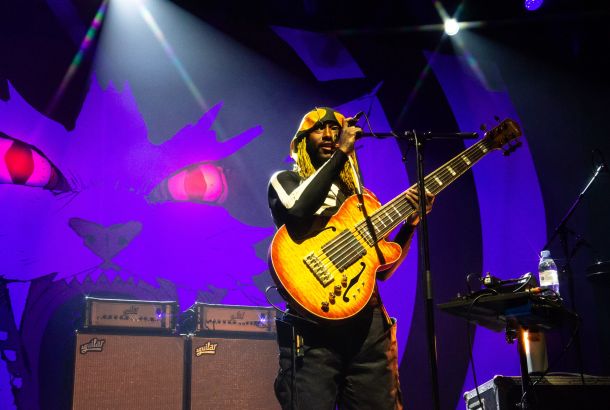Interview: 65daysofstatic
By Joe Goggins
“It was all loosely tied together and inspired by something called the Imagist manifesto, but it can probably be more accurately described as the noise equivalent of screaming into the abyss.” Paul Wolinski – who, I suppose, is the de facto frontman of 65daysofstatic – is filling me in on the band’s recent ‘Sleepwalk City’ performances at the Tramlines Festival in their native Sheffield, intended as a preview of their forthcoming sixth studio record, Wild Light.
“We built an audiovisual installation at the Millennium Galleries that featured sixteen speakers, a massive P.A., and big, glitchy visuals. It ran on a loop throughout the day, creating a cloud of noise and drones in the room that you could walk through, or that sometimes swirled around you. The audio itself was a thirty minute version of a song called ‘Sleepwalk City’. The original version will be on our new record. Both these projects were built at the same time over the spring months of this year, so they’re very similar in thematic and conceptual terms.”
“In the evenings, we played a few experimental live shows, using the P.A. and all sixteen speakers, creating what you could probably charitably describe as a cacophony of noise and weirdness.”
It’s a description you could just as easily extend to much of the 65days catalogue to date; since forming in Sheffield in 2001 (although Wolinski himself is from here in Manchester – “the best city in the world”, as he terms it), they’ve become old hands at conjuring up epic soundscapes, with their appetite for blending guitars with a host of electronic elements making them one of the most forward-thinking post-rock outfits around.
Disaster struck just days before the Tramlines shows, when the band’s rehearsal space was broken into and most of their gear stolen. Online appeals for its return have so far proved fruitless, according to Wolinski: “All we’ve had back so far is the most easily-replaceable thing that was taken, a bass guitar If you see any rogue instrumental bands pop up with guitars that never quite sound in tune, do let us know.”
On their last full-length, We Were Exploding Anyway, the band made a firm shift towards electronic territory, particularly on the record’s closer; the sprawling, ten-minute ‘Tiger Girl’ was the band’s most danceable effort yet. It’s not an approach, though, that they’ve continued to take on Wild Light.
“There’s a lot of programming and electronics on the new record, but it’s less obviously dance-based,” says Wolinski. “You can’t out-‘Tiger Girl’ ‘Tiger Girl’, really. So, yeah, there’s some stranger things going on. I suspect that when we get some of these songs into the live show, though, the beats will be that little bit tougher anyway.”
I tell Wolinski that I haven’t seen the band play live since last summer, when they unveiled a handful of new tracks at the Cockpit in Leeds. “They’ll definitely have changed since then. There are eight songs on the record. They’ve all been through countless iterations, hopefully becoming more focused with each pass. We’ve probably been working on the album for about two years, but it had a pretty fuzzy beginning. We were a bit intimidated about having to follow up We Were Exploding Anyway, so we tried to trick ourselves into writing new material without realising we were doing it. It’s probably still not finished now. What songs ever are?”
One distraction that did crop up between the last record and the new one was the band’s involvement with a project that saw them compose an original score for Silent Running, performing it live alongside showings of the film and eventually releasing it on limited vinyl.
“That all happened before we properly got started,” recalls Wolinski. “It came about by accident – we wrote and performed the live soundtrack for the Glasgow Film Festival originally, thinking that would be the only place it ever existed. It turned out really well and got a great response, so it spiralled and we toured it and eventually turned it into a limited edition record. That came out towards the end of 2011, so there might have been a little bit of overlap with the Wild Light material.”
WL from 65daysofstatic on Vimeo.
Given that it was the last major project that the band embarked upon before throwing themselves solely into the writing and recording of Wild Light, you’d have to assume that the Silent Running record had some kind of influence on what followed it. “I’m sure it did, but I don’t know how conscious that was. The things we learnt with Silent Running were more about playing with the rules of composing soundtracks, rather than standalone songs. You don’t always want to grab the listener’s ear – the music serves the image.”
“A great quote from Walter Murch in David Byrne’s book, How Music Works, describes music as “the main poetic metaphor for that which could not be preserved”, which is perfect. On the other hand, when making a record, the song is the song; it’s the ultimate and singular expression of whatever it is you’re trying to say. It needs to demand attention, to get in your way.”
Irrespective of whether previous output has rubbed off on the new album, Wolinski insists that the songwriting process remains largely enigmatic, at least from the band’s point of view. “I wish we knew. I think the main thing is probably that we all just kept showing up each day. We’re either stubborn, or institutionalised. Most likely both. For one reason or another, it doesn’t come particularly easy to us. You hear these great ideas in your head, realise that you can’t actually pull them out into the real world, and so you clumsily build representations of them using whatever tools you have to hand.”
Perhaps owing to the striking diversity of the 65days back catalogue – they’ve been known to swing between heavy dependence on guitars to similar reliance on electronics – Wolinski refuses to be drawn on possible similarities between Wild Light and previous 65 records.”I hope that it is distinguished enough to stand on its own as being unlike the rest of them. We have no desire to repeat ourselves. If pushed, though, I suppose I’d pick The Fall of Math. The production on Wild Light sounds a lot better though.”
It’s pretty much the modus operandi of any post-rock band to try to tap into some kind of emotional spectrum in a wordless manner. As much as I don’t want to pigeonhole 65days as a strictly post-rock outfit, it’s striking that the band obviously have fairly strong political views; comments made on stage and through their social media outlets clearly point towards a left-wing outlook, but is it really possible for a song with no lyrics to sound political? You assume it has to permeate the music that 65 make, in some manner.
“Definitely. I mean, there’s a whole other conversation to be had about what ‘political’ means. I understand the shorthand of the term, but when you start to examine it, the edges get kinda fuzzy. Everything’s political, isn’t it? The world is happening and everyone is making it happen, all of us right here on the front line, making it up as we go along.”
“To paraphrase Milan Kundera – he was talking about novels, but it applies to any medium I think – “What is essential in music is precisely what can only be expressed by music.” It’s a bigger idea when he’s talking about novels because he’s discussing adaptations, screenplays, and so on, but the basic point holds: whatever form you choose, what is going to make it worthwhile is finding the ideas that can only be expressed using that form, and push in that direction.”
“This makes sense to me. I mean, I don’t mean to sound melodramatic, but the world’s not getting any better, is it? In this country alone the audacity of those millionaires in government is breathtaking, as is this weird, angry-but-apathetic malaise the rest of us seem to be trapped in. Arguably a more useful form of response to this is some rousing agitprop, but realistically, doesn’t listening to Godspeed or William Basinski seem to capture what being in this environment actually feels like? Even now, I’m not sure I agree with anything I just said,” he laughs.
As a band that have shown little reluctance as far as the heavy incorporation of classical instrumentation is concerned – one of their biggest ‘hits’, ‘Radio Protector’, is dominated by racing piano lines – I’ve always wondered if 65 had ever considered recording with a full orchestra. “That would honestly be great,” says Wolinski, “but do you know how much that costs?” He’s also non-committal on the idea of marking the tenth anniversary of their debut LP, The Fall of Math, next year; with a merch-obsessed cult fanbase that have heard only select cuts from the album live over the past few years, you’d assume that it’d be a worthwhile endeavour, but the question is met with a mere “maybe.”
Wolinski concludes the interview by claiming that he can ‘definitely’ foresee a day when he wouldn’t want to make more 65days records – despite the band’s steady career trajectory to date – and also lets me down gently when I submit a request for next month’s show at Sound Control; “we have literally dozens of better songs than ‘Aren’t We All Running’. Honest.” I can’t decide whether or not that’s an immodest statement, but conclude it probably isn’t; 65daysofstatic are a band who have carved a living out of being four unassuming guys that just so happen to make music that’s almost always thrilling in the extreme.
65daysofstatic play Sound Control on September 23rd. Wild Light is available via Speedball Records from September 16th







